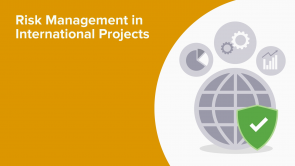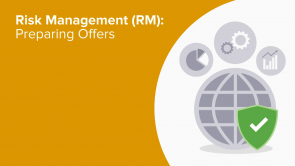Preparing Offers - Introduction
About the Lecture
The lecture Preparing Offers - Introduction by Simone Hoferer is from the course Risk Management (RM): Preparing Offers. It contains the following chapters:
- Introduction & get to know Simone Hoferer
- Objective of this training
- Introduction
- Differences between risks
- Identifying international risks
- What does my project require?
- What is different or strange?
- Danger of wrong decision
- Implications international
- Why risk management during quoting stage?
Included Quiz Questions
Define the global village.
- It describes our modern world in which distances are diminishing, networking is growing fast and internationality is becoming more and more understood and common.
- The whole world is being closely connected by modern telecommunications and becoming interdependent economically, socially, and politically.
- It describes our modern world which does not contain endless cultures but in which all cultures form one culture due to the close connection via modern technology.
- It is a synonym for our world as it was a thousand years ago.
We can identify opportunities and dangers in international projects ....
- not as good as for projects in our home countries, since we are not as familiar with them and we are often not able to identify the indicators for risks.
- as good as in projects in our home country.
- much easier since they stand out more in an unfamiliar context.
- not as good, but since projects are pretty similar it is negligible.
What is different or unfamiliar in international projects?
- Big differences may occur in e.g. legal system, culture, language, mentality, import and export regulations.
- Mostly only the language or the currency, sometimes we have to get used to left-hand traffic.
- Sometimes we cannot read the foreign characters on street signs.
- Foreign countries are just further away. Therefore, one just has to take care about the various time zones.
Why should you prepare thoroughly before you start an international project?
- Because international projects are similar to adventure trips. Before going on an adventure trip you would prepare yourself and not blindly start something unknown and strange.
- Because the danger of wrong decisions is greater. Unknown or foreign situations may lead to misunderstandings, misinterpretation or incorrect/bad decisions.
- Because wrong decisions are often very expensive and in most cases take up a lot of time and money and imply the risk of not being able to keep the deadlines.
- Because you want to make a good impression on your boss in order to increase the possibility of a pay rise.
- You do not need to prepare thoroughly before you start an international project as long as you have somebody with you who is aware of the differences of the foreign and your own culture.
Why are the implications of misunderstandings much graver internationally?
- Great distances mean more travel or shipping time which equals to higher financial efforts.
- Entry visa permits are often required and at times a translator or middlemen is inevitable.
- Emergencies cause stress and hectic and mess up schedules.
- Unscheduled purchases of goods or services are often more expensive and lead to higher effort in sourcing.
- They are not much graver than nationally because the costs are the same.
When is the best time to solve a problem?
- Before it is onset.
- When it is urgent.
- Just when problems accumulate and turn into a crisis.
- It is best to ignore problems and wait till they are over.
Why should you perform risk management during the quoting stage?
- To avoid or at least reduce ill surprises during the course of project
- To avoid wrong decisions which can be very expensive, cause tress and require additional of the already scarce resources
- To prove to your employees and your boss that you are trustworthy
- To avoid misguidance by wrong assumptions about a foreign culture by your employees
Customer reviews
4,0 of 5 stars
| 5 Stars |
|
0 |
| 4 Stars |
|
1 |
| 3 Stars |
|
0 |
| 2 Stars |
|
0 |
| 1 Star |
|
0 |
1 customer review without text
1 user review without text
Excerpts from the accompanying material
... 1: preparing offers successful identification & precaution measures ...
... •interior and furniture designer •Master ...
... Several years of experience in: •Project management, supervisor and quoting •Realization of projects ...
… are able to identify, analyze and evaluate risks and chance for the preparation offers. ...
... 2. Fundamentals, terms and definitions 3. Risk management projects (basics) 4. Phases of the risk management ...
... to travel around the world. And to discover the joy ...
... join me with your future projects on a trip around the world ...
... internationality becomes more and more understood and common. However, quite often ...
... New York, Berlin, Paris, Dubai, Mexico City, Tokyo, Rio, Buenos Aires ...
... What does my project require? ...
... Indicator for potential dangers => Graphic 1: ...
... in order to be able to plan ahead for the projects route and to ...
... know them yet or we aren´t really aware of them. If we are looking too much from our cultural point of view on projects in ...
... don't know the hiking trails through the Himalayan mountains, if we haven´t been there before. Just because we are dealing with known products ...
... comparison of an adventure trip with an international project lies a important key in how to approach strange ...
... -How many different nationalities do you know personally (including neighbors and work acquaintances)? Goal: To gain insight how much knowledge you already have ...
... Religion & code of ethics > Socialization & behavior > Customs, habit & norms > Legal system => sometimes missing legal ...
... eat up a lot of time and money and imply the risk of not being ...
... Misinterpretations are expensive, because…
... •Unscheduled purchase of goods and services often more expensive and higher effort in sourcing •Emergencies cause stress and hectic and ...
... during quoting stage? To avoid or at least reduce ill surprises during ...





